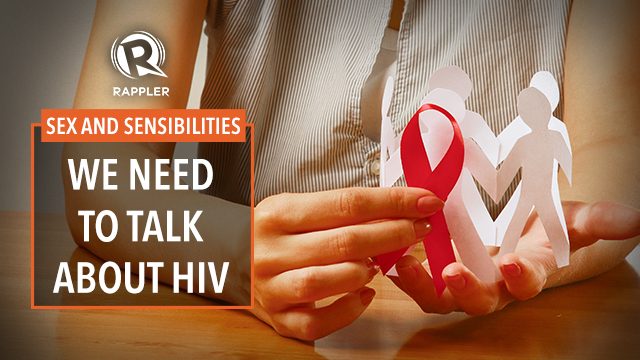SUMMARY
This is AI generated summarization, which may have errors. For context, always refer to the full article.

MANILA, Philippines – Why shouldn’t we?
On the 4th episode of the Sex and Sensibilities podcast, Ana P. Santos talks to Chris Lagman, founder of the blog Manila Gay Guy and counselor at Love Yourself Inc, a community of volunteers advocating HIV awareness.
The two talk about myths surrounding HIV, the stories behind the statistics, the science of safe sex, and the many ways we can protect ourselves as well as others.
Combatting HIV/AIDS is part of the Millennium Development Goals, and just like other MDGs, the Philippines will most likely fail this battle, according to the United Nations. (READ: PH won’t meet HIV/AIDS target)
In February 2015, 646 new cases of HIV infections in the Philippines were reported. This is the highest number since the country’s first case in 1984, said the Department of Health (DOH).
In the Philippines, there have been a total of 23,709 HIV positive cases and 1,149 documented deaths. (READ: HIV in 6 PH cities may reach ‘uncontrollable’ rates)
Spread awareness, not disease
On the upside, Lagman observed that more Filipinos are getting tested and seeking help. The earlier you get tested, the earlier you can get the necessary treatment.
Stigma can kill. In the Philippines, buying contraceptives like pills or condoms can be difficult especially among the youth. They may feel embarrassed walking up to the cashier to pay for or ask for condoms. This should not be the case, advocates say, there is nothing shameful about ensuring safe sex.
Santos also stressed the importance of knowing how to properly use condoms, highlighting these reminders:
- Check the expiration date of condoms
- Make sure it is not broken
- Water-based condoms are better since they provide lubrication
- Wear it before any penetration occurs: Remember that premature ejaculation can also lead to pregnancy or sexually transmitted infections (STI)
Lagman added that it is not only men who have sex with men (MSM) who are at risk of getting HIV, but anyone engaging in high-risk sexual behaviors such as unprotected sex. Pregnant women may also pass it down to their children.
But why do statistics say that MSM are more at risk? This is where science comes in: The highest risk in terms of modes of transmission is unprotected penetrative sex, which has 3 kinds
- Penis to Mouth
- Penis to Vagina
- Penis to Anus
Among these 3, penis to anus has the highest risk because the lining in the anus is more sensitive and can easily break. Hence, it is more vulnerable to becoming a portal of entry for the virus. Women have natural lubricants; however, men do not, Lagman stressed. This is why it is better to use water-based condoms, especially among MSM, to lessen friction and prevent condoms from tearing.
Health advocates also warn against parents, schools, the church and other authority figures who label sex as bad or dirty, without really explaining what it is.
If people do not learn about safe sex, then you are exposing them to the risk of having the opposite – unsafe encounters.
Get tested
Lagman shared that testing for HIV matters even for younger people. For example, if someone tested positive for HIV at 18, there is chance that he or she could have had it as early as 15.
The problem is that several young Filipnos do not access such information and services. In fact, there are health centers offering free HIV tests, counselling, and treatment.
Love Yourself Inc has testing hubs along Shaw Boulevard and Malate, its services are for free. Some local governments – like Quezon City, Marikina, Paranaque, Mandaluyong – also operate social hygiene clinics providing free tests. There are also hospitals offering the same services but for a fee.
There is no reason not get tested. (READ: HIV tests are not bad!)
Under Philippine law, testing centers must protect the privacy of all clients. If you do not want to give your name, it is okay. All testing centers must also be free from discrimination and must provide counselling.
In fact HIV/AIDS education should be taught in schools, workplaces, and communities as mandated by Republic Act 8504 or the Philippine AIDS Prevention and Control Act of 1998.
So how do HIV tests work? Lagman says it’s simple:
- At the center, the client will fill up a form, but is not required to give identification
- Pre-test counselling
- The client will sign a form, agreeing to get himself or herself tested. No one can get tested without their consent.
- Blood extraction (around 10 ml)
- Result will be ready in 1 or 2 hours
- Post-counselling: If the result is positive, the counselor will advise you on the next steps you should take; if it is negative, the counselor will advise you how to prevent HIV
Lastly, Lagman emphasized the “Triangle of Self Care” or TSC steps:
- Timely testing and treatment: Get tested every 6 months. It might take some time, even years, before HIV manifests
- Safe and satisfying sex: Be mindful of your and your partner’s safety
- Correct and consistent use of condoms and lubricant
It is real, it is happening, and it is claiming lives. The first thing we can do is talk about it. Then go and spread awareness, not stigma. – Rappler.com
For more information on HIV, test center locations and schedules, available services, and volunteer opportunities, visit Love Yourself Inc here.
Got stories to tell? Share your ideas and stories surrounding gender and development with move.ph@rappler.com. Speak up on #GenderIssues!
Add a comment
How does this make you feel?
There are no comments yet. Add your comment to start the conversation.